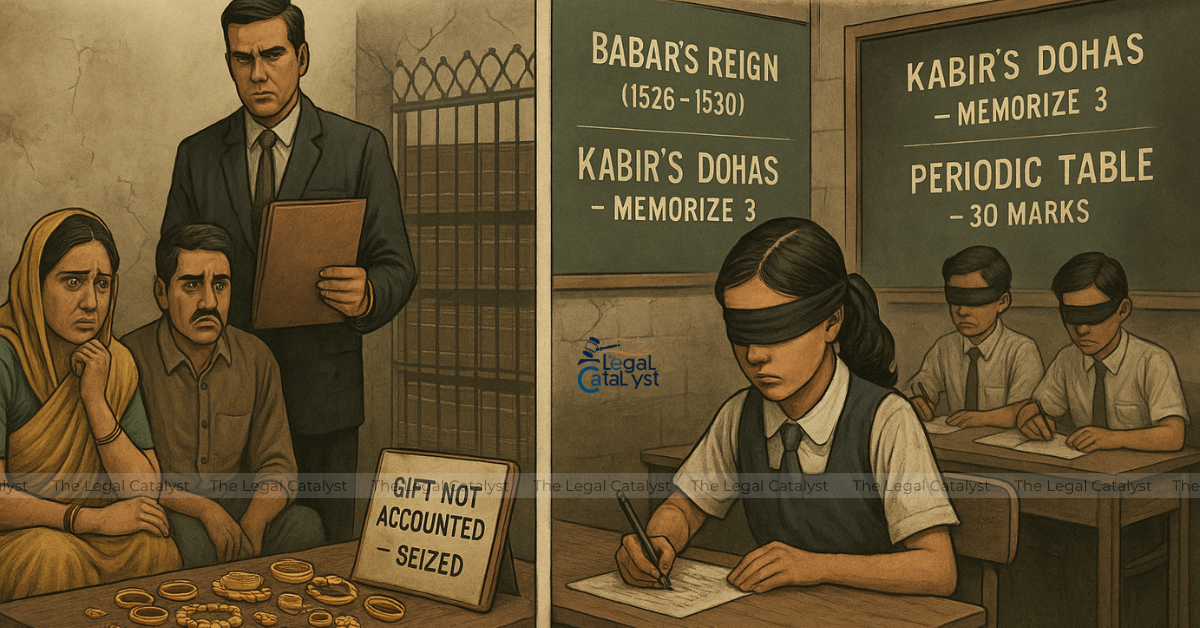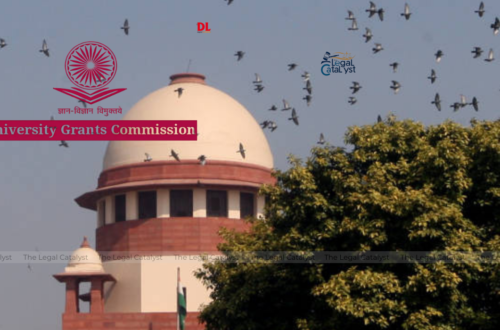A middle-class Indian family receives gold as gifts over the years — during weddings, festivals, and childbirths. Like millions of others, they store it safely at home, passed down through generations. One day, during an income tax raid, authorities find over 1 kg of gold. The family says it was all gifted. The officer asks for proof — receipts, declarations, donor details. They have none. The gold is seized, a penalty is imposed, and they are treated like criminals. Confused and humiliated, the family pleads, “We didn’t know we needed proof for gifts. It was all family gold.”
But the officer insists on the inevitable. Every Indian hears it at some point: “Ignorance of the law is no excuse.”
Now stop and ask: were they ever told this in school? Did the son who earns now, the daughter who’s a teacher, or the parents who worked their entire lives — were any of them ever taught the basics of tax law? Did any chapter in any textbook tell them that you need to document gifts, that there’s a law limiting gold holdings without proof, that gifts from non-relatives above ₹50,000 are taxable, or that during a raid you can lose everything you own simply because you didn’t keep a slip of paper?
No. But they were probably made to memorize the structure of Akbar’s court. They were graded on their ability to recite Kabir’s dohas and to recount the adventures of Ashoka. They were taught about wars that ended centuries ago, kings who are irrelevant today, and moral stories that vanish after exam season. But not one lesson — not even by Class 12 — taught them about the laws that could change or destroy their lives.
This is the foundational tragedy of India’s education system — we are trained to remember facts, not understand life. We are forced to glorify irrelevant rulers, memorize dead poetry, and digest religious and cultural repetition under the name of “heritage” while the actual tools needed to survive in a modern republic are hidden, ignored, or worse — treated as optional, specialist knowledge. Law is one of them.
Law, in this country, is locked behind a gate. If you want to learn it, you must voluntarily study law as a subject after school, get into a law college, spend 5 years studying it, and only then will you be allowed to understand how the system works. But here’s the problem: every citizen is still expected to obey every law the day they turn 18. Even a chaiwala, even a rickshaw puller, even an unemployed man is subject to rules he never read, rights he never knew, and punishments he can never predict. This is not just a flaw. It’s a betrayal.
This country prides itself on being the world’s largest democracy, but how can democracy function when its people have no idea what powers they hold or what protections they are entitled to? The Constitution is never taught in full. Rights are mentioned like fairy tales — nice to hear, but too vague to act upon. Duties are printed in textbooks but never drilled into social consciousness. Law, meanwhile, is treated like a priestly language, restricted to lawyers, judges, and police, while the average Indian is expected to remain ignorant but obedient. That’s not democracy. That’s tyranny in disguise.
The rot runs deep. We have chapters on Mughal emperors, but not on the structure of Indian courts. We know the literary meaning of a doha but not the practical meaning of bail. We are taught to solve trigonometry problems that we’ll never use again but aren’t taught how to read a legal notice, write a complaint, or understand a contract. This is not accidental — this is design. The Indian education system was never built to produce informed citizens. It was built to produce silent workers. The British designed it to create clerks, not rebels. And post-independence, our own governments kept it intact, because nothing scares a corrupt system more than an aware public.
The result? We are a nation of youth who know Shakespeare but not the IPC. Who can quote Newton’s laws of motion but not Article 21? Who can draw the digestive system but can’t digest the fact that their landlord is violating their rights. Who can tell you what Gandhi wore on Dandi March, but can’t tell you what to do if the police detain you illegally. This is not education. This is programmed helplessness.
So what must be done?
We must tear apart the current structure and rebuild it from the ground up. Legal literacy must be mandatory by Class 8. Every student should know the basic structure of the Constitution, the rights they have, the duties they must perform, the functioning of police and courts, the meaning of common terms like FIR, IPC, PIL, bail, contract, tax, digital fraud, workplace harassment, and consumer rights.
We must teach children not just how to pass exams, but how to protect themselves in the real world. Replace two chapters of ancient history with practical civic studies. Introduce real-world roleplay on legal situations. Bring in local lawyers and police officers to explain common laws in classrooms. Make law a subject, not an afterthought. Turn the syllabus into a shield, not a cage.
Because let’s be clear: ignorance of the law may not be an excuse, but in today’s India, it is a manufactured condition. A nation that demands legal obedience without providing legal education is not only unjust, but also dangerous. It creates citizens who are easy to exploit, quick to fear, and slow to rise. It keeps the powerful safe and the masses silent. It is high time we call this what it is — a system designed to keep the people in the dark. And it’s time we stop tolerating it.
No exam result, no history lesson, and no moral story will ever matter until every Indian child learns how to defend themselves through knowledge.
A country where people are trained to obey but not understand will always remain a slave.
This happens no matter how many times it claims to be free.
Connect with us on Instagram – X – LinkedIn for daily updates, quizzes, and other materials
For More- The Legal Catalyst






